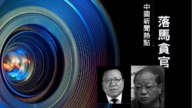【新唐人2013年09月04日訊】中共中紀委和監察部主辦的綜合性網站9月2號正式上線,網站宣稱,可以接受民眾對反腐工作的意見,並提供網民舉報貪官的通道。當天,中紀委書記王岐山、副書記趙洪祝還親自出馬,到場做所謂的調研。不過,中紀委開通舉報網站隱藏著甚麼機關呢?目的真的是反腐嗎?我們來看觀察人士的分析。
中紀委監察部網站介紹,網站作為中紀委、監察部信息公開、新聞發佈、網路舉報的主管道,將打造成所謂的宣傳教育、網路監督等平臺。
網站除了提供一些監察信息,如監察部電話、地址外,還提供了網民舉報貪官的通道,包括「實名舉報」與「匿名舉報」。
深圳獨立作家朱健國:「它是打著收集信息,收集輿論,收集民意的這麼一步棋來控制,現在各部都在加強對民間輿情的監測和控制,這就是對輿情的監測和控制,它是這樣一個目的,它並不是鼓勵放開的、自由的監督。」
朱健國指出,中紀委並不是一個真正的反腐機構,它只是中共維護專制政權的工具。
大陸《權利運動》組織發起人胡軍:「根本就不需要舉報箱,因為整個網路媒體就是一個最大的反貪腐的信息平臺,312這公開透明的多快,效應多好,他們為啥要單獨設一個?原因就是它要有選擇性的反貪。」
中共十八大後,在中共新領導人習近平和王岐山掀起的所謂反腐浪潮中,中國網路實名舉報蔚然成風。去年11月,重慶不雅視頻男主角雷政富的醜聞曝光,在網路發酵63個小時後,雷被免職,之後更有21名涉案淫官被免職。
中共原發改委副主任劉鐵男,去年也被網路舉報,今年5月他被控涉嫌嚴重違紀,8月初,劉鐵男被雙開。8月8號,被網路曝光集體嫖娼的4名上海法官,3人被撤職、1人被免職。
胡軍:「本身中共體制就是一個腐敗集團,應該反的是這個體制,把這個體制解體掉,是它做的一件真正的反腐的事情。如果抱著這個體制的話,那反腐只能是打擊異已做秀,為了維護這個體制剷除異已,這是它們的目的。」
8月下旬,廣州《新快報》記者劉虎被警方以「涉嫌尋釁滋事罪」刑拘。他曾經在微博上實名舉報中共國家工商總局副局長馬正其,陝西公安廳長杜航偉等,4名副部級官員貪腐,
朱健國:「中紀委的存在本身就是一個腐敗,中紀委壟斷了反腐的權力,法院、檢察院都沒權力第一時間去反腐,必須有中紀委交待了,它們才能支持,那麼中紀委誰來監督它呢?沒人監督它,它本身就是一個政治腐敗的產物。」
事實上中紀委監察部網站開通之前,今年4月,《人民網》、《新華網》等中共喉舌網站也推出了所謂的網路舉報監督專區,宣稱希望網民舉報各地官員違紀違法行為。7月1號,國家信訪局也開放網上投訴受理內容,國家信訪局局長還信誓旦旦的號稱,認真辦理網上信訪訴求。
重慶市民韓良:「它已經茍延殘喘了,它的政權馬上就要垮臺了,我們老百姓馬上要爆發了,又來安慰我們說可以信訪,要給我們解決問題,它還是欺騙我們,共產黨一天不垮臺,老百姓沒有一天的好日子。」
韓良強調,中共當局開通這些所謂的舉報網站,是想把民眾的舉報途徑規範在它們可控制的範圍內,但民眾已經清醒了,不會上當,也不會去配合它們。
採訪編輯/李韻 後製/李勇
Hidden Purpose of Wang Qishan Anti-Corruption Website
On September 2, the Central Commission for
Discipline Inspection (CCDI) and Supervision
Ministry jointly launched a new website.
The website provides a platform for
netizens to report corrupt officials.
On the same day, Wang Qishan, the head
of CCDI, along with his deputy Zhao Hongzhu,
visited the operators of the website.
What was the purpose of launching this website?
Can it really implement anti-corruption?
Let’s take a look at our commentators analysis.
The anti-corruption website states that it will be a
major channel to release news, interpret policies,
and receive online reports of improper behaviors.
The website provides inspected information, such as
a corruption hotline, address and channel to report corrupt
officials, either anonymously, or by using their real names.
Zhu Jianguo, Shenzhen independent writer: “They
claimed to collect information and public opinion.
However, in reality, they intend to intensify control
and monitor citizens, to restrain freedom of expression.
This is its purpose, and it isn’t to
encourage transparency and freedom.”
Zhu points out that the CCDI isn’t
an anti-corruption department.
It is a tool to maintain the Chinese
Communist Party’s (CCP) dictatorship.
Hu Jun, founder of Human Rights Campaign in China:
“It is unnecessary to set up an anti-corruption website.
The entire internet is the largest anti-corruption platform.
It is quick, efficient, and transparent,
so why do they still need a new one?
It is because they are selective in their fight of corruption.”
After the CCP 18th Congress, the new leader Xi Jinping
and Wang Qishan vowed to fight corruption.
Thus, by using real name online reports,
corrupt officials become a new fashion.
In November 2012, the Chongqing official
Lei Zhengfu’s sex tape scandal was exposed.
63 hours later, Lei was sacked, and
21 linked officials were dismissed.
Liu Tienan, a former top economic
official was reported online.
In May, Liu was suspected of grave violations of discipline.
In August, Liu was expelled from the party and his position.
On August 8, four Shanghai judges were exposed online.
It revealed they were hiring prostitutes. Later, three of
them were expelled from the party, and one was sacked.
Hu Jun: “The CCP system is corrupt, and
should be cracked down and collapsed.
This is real anti corruption by doing this.
To hold the CCP system, talking about
anti corruption is just an empty talk.
Their purpose is to remove
opponents, to maintain its regime.”
In late August, Liu Hu, a journalist of Guangzhou’s New
Express Daily was detained. on suspicion of causing trouble.
Liu reported on a microblog about senior official
Ma Zhengqi, Shan’anxi police chief Du Hangwei and
four other deputy ministry-level corruption officials.
Zhu Jianguo: “The CCDI is corrupt, now
they control the power of anti-corruption.
The Court and Procuratorate had no first rights
of anti-corruption, and they need CCDI’s order.
Then, they can act.”
Since the CCDI’s anti-corruption site opened,
the websties of state-owned media Renmin
and Xinhua had also launched similar columns.
They claimed that they hope netizens
report officials’ violation of discipline.
On July 1, the State Council correspondence
department opened an online reporting site.
They claimed to be dealing seriously with letters and appeals.
Han Liang, Chongqing citizen: “The CCP
struggles for survival, and will soon collapse.
When civilians are close uprising, then they
come to cool us down by saying we can appeal.
They say they will deal with our problems.
They are cheating us. We can’t
have a good life if the CCP exists.”
Han Liang stresses that all these so-called
anti-corruption sites are put the control of
reporting channels in the hands of the CCP.
The people are awakened now, and will
no longer believe it, nor co-operate with them.



























